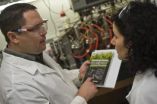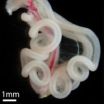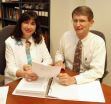(Press-News.org) HOUSTON -- (Aug. 10, 2011) -- In a biotechnological tour de force, Rice University engineering researchers this week unveiled a new method for rapidly converting simple glucose into biofuels and petrochemical substitutes. In a paper published online in Nature, Rice's team described how it reversed one of the most efficient of all metabolic pathways -- the beta oxidation cycle -- to engineer bacteria that produce biofuel at a breakneck pace.
Just how fast are Rice's single-celled chemical factories? On a cell-per-cell basis, the bacteria produced the butanol, a biofuel that can be substituted for gasoline in most engines, about 10 times faster than any previously reported organism.
"That's really not even a fair comparison because the other organisms used an expensive, enriched feedstock, and we used the cheapest thing you can imagine, just glucose and mineral salts," said Ramon Gonzalez, associate professor of chemical and biomolecular engineering at Rice and lead co-author of the Nature study.
Gonzalez's laboratory is in a race with hundreds of labs around the world to find green methods for producing chemicals like butanol that have historically come from petroleum.
"We call these 'drop-in' fuels and chemicals, because their structure and properties are very similar, sometimes identical, to petroleum-based products," he said. "That means they can be 'dropped in,' or substituted, for products that are produced today by the petrochemical industry."
Butanol is a relatively short molecule, with a backbone of just four carbon atoms. Molecules with longer carbon chains have been even more troublesome for biotech producers to make, particularly molecules with chains of 10 or more carbon atoms. Gonzalez said that's partly because researchers have focused on ramping up the natural metabolic processes that cells use to build long-chain fatty acids. Gonzalez and students Clementina Dellomonaco, James Clomburg and Elliot Miller took a completely different approach.
"Rather than going with the process nature uses to build fatty acids, we reversed the process that it uses to break them apart," Gonzalez said. "It's definitely unconventional, but it makes sense because the routes nature has selected to build fatty acids are very inefficient compared with the reversal of the route it uses to break them apart."
The beta oxidation process is one of biology's most fundamental, Gonzalez said. Species ranging from single-celled bacteria to human beings use beta oxidation to break down fatty acids and generate energy.
In the Nature study, Gonzalez's team reversed the beta oxidation cycle by selectively manipulating about a dozen genes in the bacteria Escherichia coli. They also showed that selective manipulations of particular genes could be used to produce fatty acids of particular lengths, including long-chain molecules like stearic acid and palmitic acid, which have chains of more than a dozen carbon atoms.
"This is not a one-trick pony," Gonzalez said. "We can make many kinds of specialized molecules for many different markets. We can also do this in any organism. Some producers prefer to use industrial organisms other than E. coli, like algae or yeast. That's another advantage of using reverse-beta oxidation, because the pathway is present in almost every organism."
INFORMATION:
The research was funded by Rice University.
Metabolism in reverse: Making biofuels at full-throttle pace
Rice University engineers reverse E. coli metabolism for speedy production of fuels, chemicals
2011-08-12
ELSE PRESS RELEASES FROM THIS DATE:
Most plant species important in various and varying ecosystems: ISU research
2011-08-12
AMES, Iowa – From the kinds that people sneeze at, to the kinds that have prickly seeds that stick to pant legs, there are many different types of plants in grasslands around the world.
According to a new analysis of plants in grassland ecosystems around the world, it turns out that most of those plant species are important.
Brian Wilsey, associate professor, and Stanley Harpole, assistant professor, both in Iowa State University's Department of Ecology, Evolution and Organismal Biology, are authors of a study on plant diversity published in today's issue of the journal ...
World Data Products, Inc. Named to Everything Channel's VAR500 List
2011-08-12
World Data Products, Inc. recently announced it has been recognized by Everything Channel as a part of CRN's 2011 VAR500 list, which ranks the top technology integrators in North America. Featuring the highest producing technology integrators and solution provider organizations in the IT channel, the VAR500 rankings consider earnings from hardware sales, software sales and managed IT services. World Data Products, Inc. placed 319 in the 17th annual ranking.
The VAR500 is a list of the largest value-added resellers, solution providers and integrators in North America ...
Study finds marked rise in intensely sexualized images of women, not men
2011-08-12
BUFFALO, N.Y. -- A study by University at Buffalo sociologists has found that the portrayal of women in the popular media over the last several decades has become increasingly sexualized, even "pornified." The same is not true of the portrayal of men.
These findings may be cause for concern, the researchers say, because previous research has found sexualized images of women to have far-reaching negative consequences for both men and women.
Erin Hatton, PhD, and Mary Nell Trautner, PhD, assistant professors in the UB Department of Sociology, are the authors of "Equal ...
Vanderbilt researchers, international team, uncover genes linked to multiple sclerosis
2011-08-12
An international team of scientists has identified 29 new genetic variants linked to multiple sclerosis, providing key insights into the biology of an important and very debilitating neurological disease.
Multiple sclerosis (MS), one of the most common neurological conditions among young adults, affects around 2.5 million individuals worldwide. It is a chronic disease that attacks the central nervous system (CNS), which includes the brain, spinal cord and optic nerves, and can cause severe symptoms such as paralysis or loss of vision.
Vanderbilt University Medical ...
Is the 'right of publicity' out of control?
2011-08-12
BUFFALO, N.Y. -- American courts are significantly expanding the legal rights and privileges celebrities can command over others using their names or likenesses. And a University at Buffalo Law School professor is questioning whether these courts have gone too far.
Clearly, says UB Associate Professor of Law Mark Bartholomew, the courts have taken a more liberal interpretation when it comes to celebrities suing others for the use or even the implication of their names, images or voices. This special legal privilege -- known as the "right of publicity" -- has expanded ...
Bird song-sharing like verbal sparring
2011-08-12
While singing the same songs as your neighbours may sound harmonious, research conducted at Queen's University Biological Station (QUBS) suggests that song-sharing amongst song sparrow populations is actually an aggressive behavior, akin to flinging insults back and forth.
"It's been hypothesized that repertoire size and song complexity is about the singer's ability to advertise their quality as a mate," says lead author Janet Lapierre, a visiting biologist from the University of Western Ontario (UWO). "Song-sharing, where birds sing a smaller number of their species' ...
Gut coils with help from its elastic neighbor
2011-08-12
Cambridge, Mass. - August 10, 2011 - Between conception and birth, the human gut grows more than two meters long, looping and coiling within the tiny abdomen. Within a given species, the developing vertebrate gut always loops into the same formation—however, until now, it has not been clear why.
Using a combination of experimental observations, biological and biophysical manipulations, theory, and computation, researchers at Harvard have shown that a "simple" balance of forces determines the form of the gut.
The finding may shed light on how the gut has been able to ...
New anti-censorship scheme could make it impossible to block individual sites
2011-08-12
ANN ARBOR, Mich.---A radical new approach to thwarting Internet censorship would essentially turn the whole web into a proxy server, making it virtually impossible for a censoring government to block individual sites.
The system is called Telex, and it is the brainchild of computer science researchers at the University of Michigan and the University of Waterloo in Canada. They will present it Aug. 12 at the USENIX Security Symposium in San Francisco.
"This has the potential to shift the arms race regarding censorship to be in favor of free and open communication," ...
Telephone trumps social media when communicating with teens about research
2011-08-12
AUGUSTA, Ga. – If you think teenagers prefer social media over the telephone, you may want to think again, at least when it comes to teens involved in research studies.
When 188 ninth-11th graders in four rural Georgia counties were asked how they preferred to be contacted about their participation in a Georgia Health Sciences University research study:
Nearly 54 percent preferred contact via cell and/or land line with a recorded message from a research assistant they know using a voice messaging call system
Nearly 24 percent preferred a personal call from the research ...
INRS researchers improve performance of iron-based catalysts
2011-08-12
Quebec City, August 10, 2011 – Having pioneered the development of the first high-performance iron-based catalyst for fuel cells, researchers at INRS recently achieved a second major advance. They developed a new and improved iron-based catalyst capable of generating even more electric power in fuel cells for transportation applications. Previously, only platinum-based catalysts could produce similar performance.
The new research findings from the team of Professor Jean-Pol Dodelet were published in Nature Communications, a prestigious scientific journal part of the Nature ...
LAST 30 PRESS RELEASES:
New ‘scimitar-crested’ Spinosaurus species discovered in the central Sahara
“Cyborg” pancreatic organoids can monitor the maturation of islet cells
Technique to extract concepts from AI models can help steer and monitor model outputs
Study clarifies the cancer genome in domestic cats
Crested Spinosaurus fossil was aquatic, but lived 1,000 kilometers from the Tethys Sea
MULTI-evolve: Rapid evolution of complex multi-mutant proteins
A new method to steer AI output uncovers vulnerabilities and potential improvements
Why some objects in space look like snowmen
Flickering glacial climate may have shaped early human evolution
First AHA/ACC acute pulmonary embolism guideline: prompt diagnosis and treatment are key
Could “cyborg” transplants replace pancreatic tissue damaged by diabetes?
Hearing a molecule’s solo performance
Justice after trauma? Race, red tape keep sexual assault victims from compensation
Columbia researchers awarded ARPA-H funding to speed diagnosis of lymphatic disorders
James R. Downing, MD, to step down as president and CEO of St. Jude Children’s Research Hospital in late 2026
A remote-controlled CAR-T for safer immunotherapy
UT College of Veterinary Medicine dean elected Fellow of the American Academy of Microbiology
AERA selects 34 exemplary scholars as 2026 Fellows
Similar kinases play distinct roles in the brain
New research takes first step toward advance warnings of space weather
Scientists unlock a massive new ‘color palette’ for biomedical research by synthesizing non-natural amino acids
Brain cells drive endurance gains after exercise
Same-day hospital discharge is safe in selected patients after TAVI
Why do people living at high altitudes have better glucose control? The answer was in plain sight
Red blood cells soak up sugar at high altitude, protecting against diabetes
A new electrolyte points to stronger, safer batteries
Environment: Atmospheric pollution directly linked to rocket re-entry
Targeted radiation therapy improves quality of life outcomes for patients with multiple brain metastases
Cardiovascular events in women with prior cervical high-grade squamous intraepithelial lesion
Transplantation and employment earnings in kidney transplant recipients
[Press-News.org] Metabolism in reverse: Making biofuels at full-throttle paceRice University engineers reverse E. coli metabolism for speedy production of fuels, chemicals






